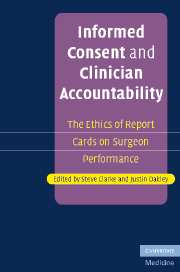Book contents
- Frontmatter
- Contents
- List of contributors
- Acknowledgements
- Introduction: Accountability, informed consent and clinician performance information
- Part I Accountability
- Part II Informed consent
- Part introduction
- 7 Informed consent and surgeons' performance
- 8 The value and practical limits of informed consent
- 9 Against the informed consent argument for surgeon report cards
- 10 Trust and the limits of knowledge
- 11 Surgeons' report cards, heuristics, biases and informed consent
- 12 Report cards, informed consent and market forces
- Part III Reporting performance information
- Index
- References
12 - Report cards, informed consent and market forces
Published online by Cambridge University Press: 08 August 2009
- Frontmatter
- Contents
- List of contributors
- Acknowledgements
- Introduction: Accountability, informed consent and clinician performance information
- Part I Accountability
- Part II Informed consent
- Part introduction
- 7 Informed consent and surgeons' performance
- 8 The value and practical limits of informed consent
- 9 Against the informed consent argument for surgeon report cards
- 10 Trust and the limits of knowledge
- 11 Surgeons' report cards, heuristics, biases and informed consent
- 12 Report cards, informed consent and market forces
- Part III Reporting performance information
- Index
- References
Summary
Introduction
What ethical ramifications might the commercial context of much modern medicine have for the report card movement? We live in a world in which medicine in general is increasingly subject to market forces; not only are more and more goods and services commodified, and hence able to be procured on the open market, but within the public sphere, market-like accountability processes are increasingly set in place. We need to consider what implications this social context might have for the ethical status of report cards. Perhaps what is morally permissible in the context of public provision might transmogrify into the morally pernicious in a commercial environment. What difference, if any, might market forces make?
In examining this question, I shall assume that the market and market forces are here to stay and provide a background context for any public policy decisions in this area. My focus will be upon the moral legitimacy of report cards in a market context. In pursuing this agenda I identify three morally salient features of markets, that concern (1) the market as an information system, (2) the market as a distributive mechanism and (3) the market as an incentive system. I subsequently argue that close examination of these features provides genuine grounds for caution. The first worry involves the distributive consequences of report cards. In so far as report cards increase the levels of distributive inequality, this is a pro tanto reason against them. The second worry involves the transformation of our incentive structures.
- Type
- Chapter
- Information
- Informed Consent and Clinician AccountabilityThe Ethics of Report Cards on Surgeon Performance, pp. 180 - 192Publisher: Cambridge University PressPrint publication year: 2007



